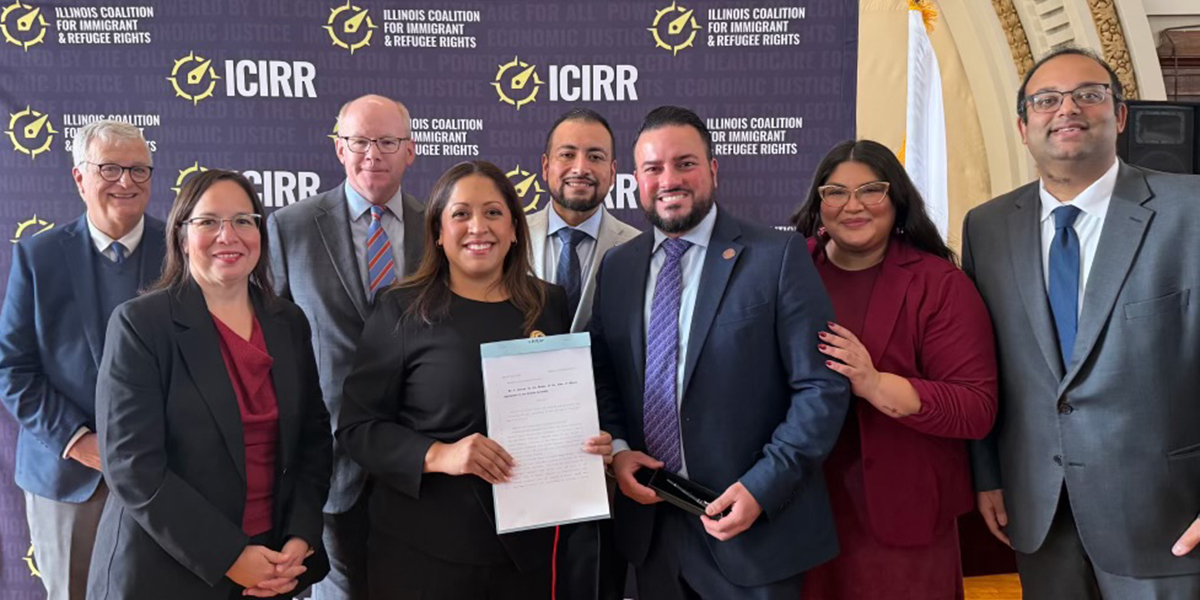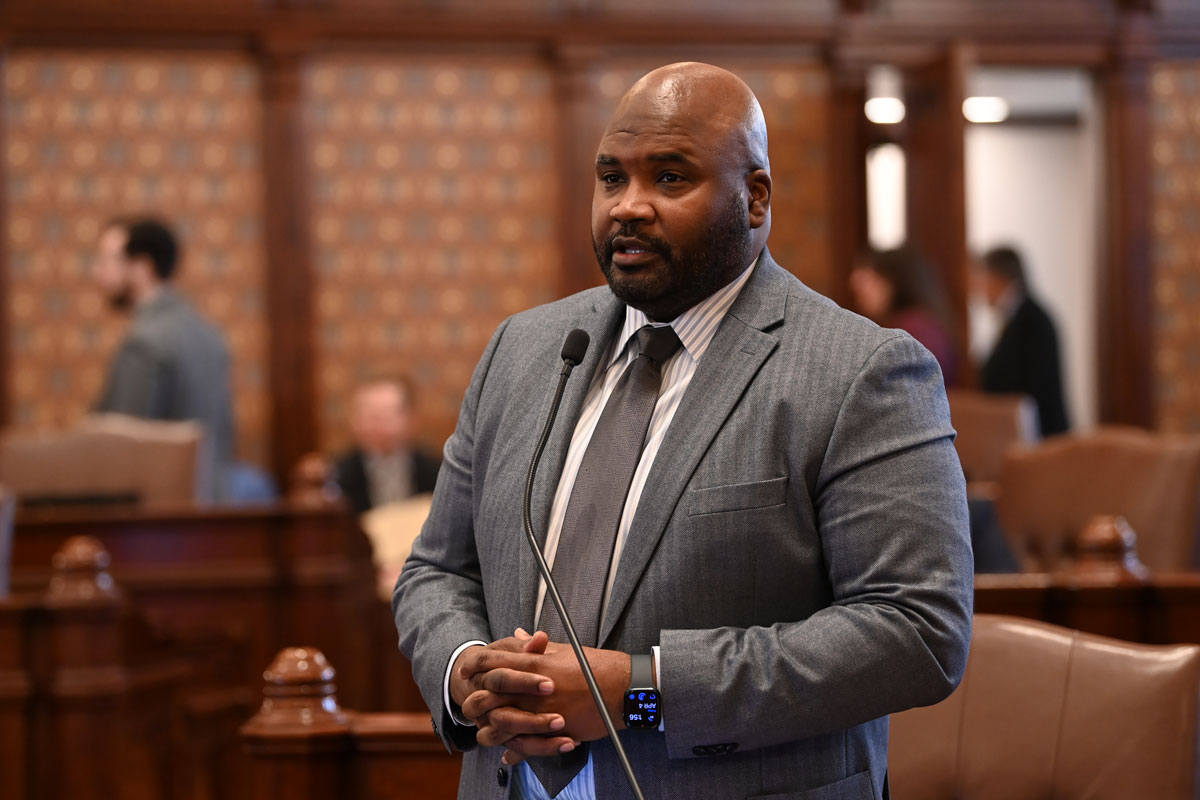- Details
- Category: Member News
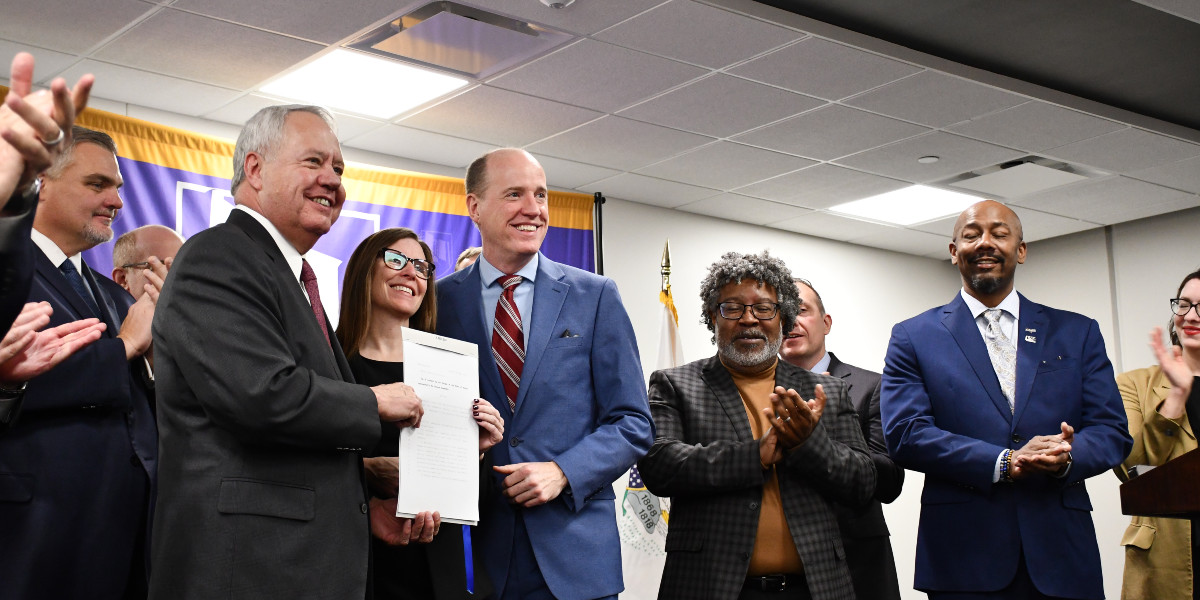
CHICAGO – Taking both affordability and sustainability into account, members of the Illinois Senate Democratic Caucus led a landmark law that is projected to save Illinois households more than $13 billion in energy costs over the next two decades.
“As Illinois and the rest of the nation face spikes in energy prices, this new law brings much-needed relief for families and gives our state the resources to protect its residents from unprecedented federal cuts,” said State Senator Steve Stadelman (D-Rockford). “This law accomplishes our goal of saving Illinoisans hundreds of dollars on utility bills annually while transitioning the state to a more reliable energy grid.”
Senate Bill 25 aims to give Illinois new tools to reduce utility rate hikes, strengthen the state’s power grid, expand renewable energy sources and keep bills low for consumers. The law contains multiple provisions to tackle rising energy costs while transitioning Illinois to a cleaner, more reliable grid.
Read more: Senate Democrat-led landmark energy relief measure becomes law
- Details
- Category: Majority Report

What's new in 2026
The end of the year is here, and with a new year comes new laws that will affect families in all corners of Illinois.
More than 250 new laws will take effect next year – from one that bans discriminatory AI in the workplace to another that enhances missing persons investigations. These include:
- Senate Bill 8: Increases gun storage safety requirements and reporting requirements for lost and stolen firearms.
- Senate Bill 24: Prohibits law enforcement agencies from observing a waiting period before accepting a missing persons report. It requires information from a missing persons report to be entered into the agencies’ data systems upon receipt of the report.
- Senate Bill 212: Requires employers to provide paid break time to nursing mothers so they may express or “pump” breast milk for their child.
- Senate Bill 314: Requires a physical fitness center to clearly disclose any change in the cost of or reduction in benefits to a customer’s gym membership at least 60 days before the automatic renewal of the membership.
- Senate Bill 710: Allows the Department of Natural Resources to issue two free deer permits to individuals who qualify for the youth-only deer season. Allows IDNR to issue nuisance permits to landowners whose property is being damaged by deer.
- Senate Bill 1274: Allows a sexual assault services voucher provided by a hospital to be used for a taxi or rideshare service to transport a survivor home, to a shelter or to the transfer hospital.
- Senate Bill 1548: Establishes a Golden Search Awareness Program to raise awareness of missing persons with developmental disabilities.
- House Bill 2517: Expands implicit bias training for health care workers in Illinois to include training in potential maternal health risk factors associated with increased mortality rate.
- House Bill 3247: Codifies a child’s right to receive a public education and to participate in public school events and activities regardless of the child’s immigration status or the immigration status of their parents or guardians.
- House Bill 3773: Makes it illegal for employers to use AI that discriminates against workers based on protected characteristics or uses ZIP codes as a stand-in for those traits in areas like hiring, promotion, job training and more.
Dozens of other laws take effect Jan. 1, 2026. Find the full list by clicking here.
Copyright 2025 - Illinois Senate Democratic Caucus - All Rights Reserved
- Details
- Category: Majority Report
Happy Holidays!
From the Illinois Senate Democratic Caucus, happy holidays!
We hope this year’s celebrations find you all safe, happy and healthy.
May 2026 bring us the strength to keep working toward a better future for ourselves and our communities.
Wishing you a wonderful holiday season and a happy new year!
Copyright 2025 - Illinois Senate Democratic Caucus - All Rights Reserved
- Details
- Category: Majority Report
Senate Democrats lead landmark legislation to enhance civil rights amid ICE activities
CHICAGO — Members of the Illinois Senate Democratic Caucus championed a new law aimed at safeguarding residents' constitutional rights and maintaining access to essential public services during increased federal immigration enforcement activity in Chicago and throughout the state.
The law responds to reports of intensive federal immigration operations in Chicago and other Illinois communities that have sparked concerns about potential constitutional violations and reduced access to critical services.
“There is no badge, no title, no mask that puts anyone above the Constitution. This law sends the message that if you abuse your authority, there are consequences,” said Senate President Don Harmon (D-Oak Park). “Our rights follow us into the courthouse, onto campus, at the hospital and when taking our kids to daycare. No one gets to take them away. We are providing the victims of this chaotic federal assault a clear, legal path to go after their abusers and hold them accountable.”
Villivalam measure securing world-class transit system for Illinois signed into law
SPRINGFIELD — State Senator Ram Villivalam spearheaded a new law providing necessary reforms and historic investments to address the public transit fiscal cliff and issues facing the system in Illinois.
“Riders, transit workers, and stakeholders from the business, labor, environmental, and urban planning sectors told my colleagues and I for years about the challenges and opportunities that exist with our public transit systems,” said Villivalam (D-Chicago). “Their concerns were the same ones I see each time I have used public transit myself – delays, ghost buses or lack of service. The status quo wasn’t working. It was time to make a change in order for people to get their school, job, and/or doctor’s appointment in a safe, reliable, and accessible way.”
Sims leads new law to protect Illinois from reckless federal budget
SPRINGFIELD — State Senator Elgie R. Sims, Jr. led the charge to insulate Illinois taxpayers from damaging federal policy shifts, ensuring the state's Fiscal Year 2026 budget remains intact despite the federal administration’s cuts to vital programs.
"The federal administration is recklessly cutting programs that Illinois families rely on, but we won't let their irresponsibility destabilize our state budget," said Sims (D-Chicago). "This law protects Illinois taxpayers and preserves our ability to fund schools, health care and essential services.”
Enshrining reproductive rights
From deceptive crisis pregnancy centers to efforts from other states to weaponize digital data, State Senator Celina Villanueva details the challenges surrounding reproductive care — and how Illinois is pushing back through landmark legislation designed to safeguard personal freedom and privacy.

In case you missed it
MEMBERS IN THE NEWS
Senator Cristina Castro, Elgin: New Illinois law makes cocktails-to-go permanent among other changes | NBC Chicago
Senator Paul Faraci, Champaign: Faraci law improves protections for missing people with developmental disabilities starting Jan. 1 | Vermilion County First
Senator Laura Fine, Evanston: New Illinois law requires employers to provide paid breaks for nursing moms | NBC Chicago
Copyright 2025 - Illinois Senate Democratic Caucus - All Rights Reserved
- Details
- Category: Senator Doris Turner News
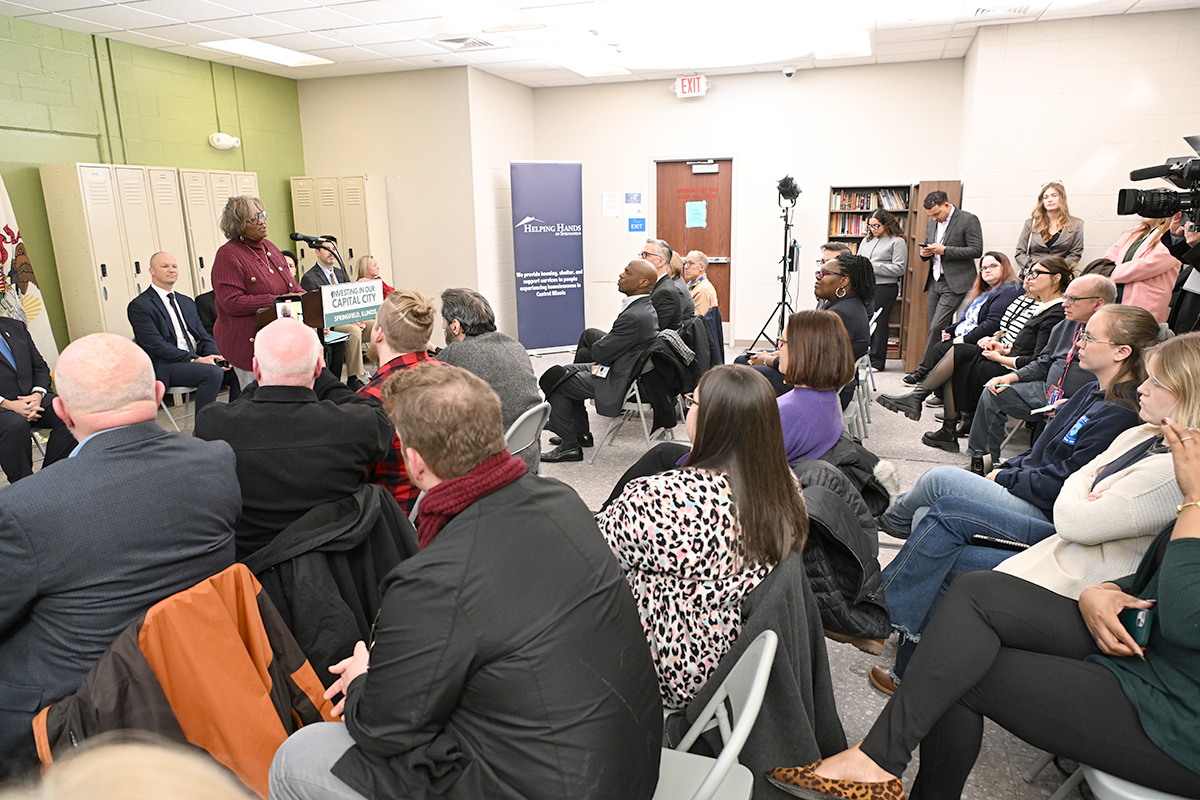
SPRINGFIELD – State Senator Doris Turner announced an investment of $2 million in community organizations dedicated to combatting homelessness in Central Illinois. These grant investments are part of the state’s interagency Home Illinois Plan, an initiative intended to drive state funding and policy toward preventing and eventually reaching functional zero homelessness – a goal where the state prevents homelessness whenever possible and ensures that if homelessness does occur, it is brief, rare and singular.
"With this funding, we are fulfilling our responsibility to help our neighbors stay housed and support our communities as they recover from the far-reaching effects of housing instability," said Turner (D-Springfield). "Every family in Illinois deserves a safe, secure place to call home, and this investment is essential to helping more families find stability, hope and a path forward."
Read more: Turner and Senate Democrats announce $2 million investment for homelessness relief
- Details
- Category: Senator Ram Villivalam News

SPRINGFIELD ─ State Senator Ram Villivalam spearheaded a new law providing necessary reforms and historic investments to address the public transit fiscal cliff and issues facing the system in Illinois.
“Riders, transit workers, and stakeholders from the business, labor, environmental, and urban planning sectors told my colleagues and I for years about the challenges and opportunities that exist with our public transit systems,” said Villivalam (D-Chicago). “Their concerns were the same ones I see each time I have used public transit myself – delays, ghost buses or lack of service. The status quo wasn’t working. It was time to make a change in order for people to get their school, job, and/or doctor’s appointment in a safe, reliable, and accessible way.”
Senate Bill 2111 creates the Northern Illinois Transit Authority, known as NITA – shifting authority from the Regional Transit Authority to the new entity that will oversee CTA, Metra and Pace. The NITA board will be comprised of 20 members, with five appointments each from the governor, mayor of Chicago and Cook County Board president, as well as one from each chair or county executive of the collar county boards of DuPage, Kane, McHenry, Lake and Will.
Read more: Villivalam measure securing world-class transit system for Illinois signed into law
- Details
- Category: Member News

SPRINGFIELD — As 2025 comes to a close, the Illinois Senate Democratic Caucus is looking ahead to measures taking effect Jan. 1.
In the new year, more than 250 new laws in Illinois will go into effect — from one that bans discriminatory AI in the workplace to another that enhances missing persons investigations. These include:
- Senate Bill 8: Increases gun storage safety requirements and reporting requirements for lost and stolen firearms.
- Senate Bill 24: Prohibits law enforcement agencies from observing a waiting period before accepting a missing persons report. It requires information from a missing persons report to be entered into the agencies’ data systems upon receipt of the report.
- Senate Bill 212: Requires employers to provide paid break time to nursing mothers so they may express or “pump” breast milk for their child.
- Senate Bill 314: Requires a physical fitness center to clearly disclose any change in the cost of or reduction in benefits to a customer’s gym membership at least 60 days before the automatic renewal of the membership.
- Senate Bill 710: Allows the Department of Natural Resources to issue two free deer permits to individuals who qualify for the youth-only deer season. Allows IDNR to issue nuisance permits to landowners whose property is being damaged by deer.
- Senate Bill 1274: Allows a sexual assault services voucher provided by a hospital to be used for a taxi or rideshare service to transport a survivor home, to a shelter or to the transfer hospital.
- Senate Bill 1548: Establishes a Golden Search Awareness Program to raise awareness of missing persons with developmental disabilities.
- House Bill 2517: Expands implicit bias training for health care workers in Illinois to include training in potential maternal health risk factors associated with increased mortality rate.
- House Bill 3247: Codifies a child’s right to receive a public education and to participate in public school events and activities regardless of the child’s immigration status or the immigration status of their parents or guardians.
- House Bill 3773: Makes it illegal for employers to use AI that discriminates against workers based on protected characteristics or uses ZIP codes as a stand-in for those traits in areas like hiring, promotion, job training and more.
A full list of laws that take effect Jan. 1, 2026 can be found here.
- Details
- Category: Senator Javier Loera Cervantes News
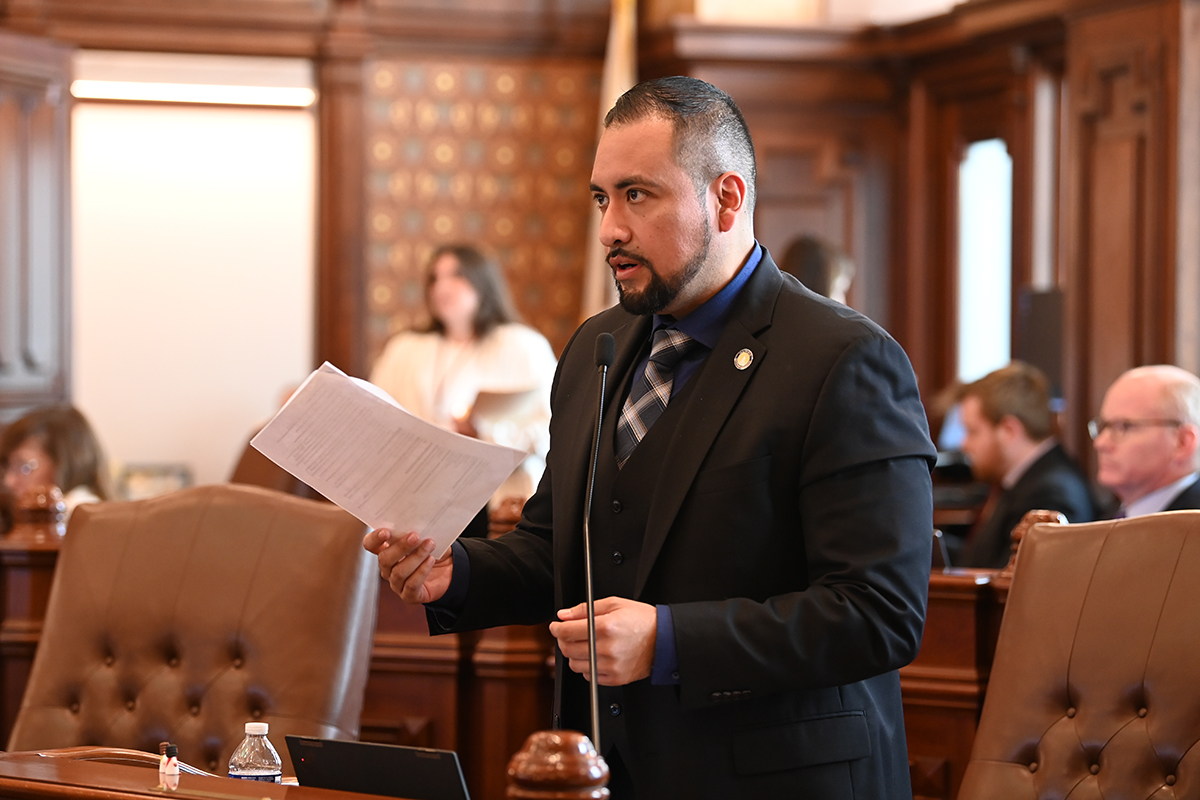
SPRINGFIELD – To protect employees from unfair retaliation from their workplace, State Senator Javier Loera Cervantes led new legislation to shield immigrant workers from surveillance and discrimination based on their perceived immigration status.
“With the increase in ICE raids and anti-immigrant sentiment at an all-time high, our immigrant workers do not feel safe in the workplace,” said Cervantes (D-Chicago). “This law will help ease their minds by establishing protections against discrimination, regardless of their status.”
Read more: New Cervantes law expands protections for immigrant workers
More Articles …
Page 3 of 764
